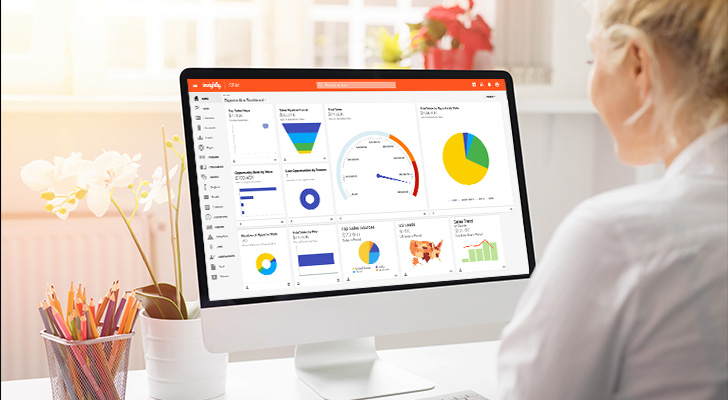Understanding a Cloud-Based CRM and How It Benefits Your Business
Delivering great customer experiences is often the single differentiator between your business and the thousands of others in a competitive market with discerning customers. This fact, among other reasons, is why a customer relationship management tool is immensely valuable. A business’ CRM is the single source of truth that keeps the company deeply connected with all of its customers.
In practice, CRM software isn’t a new concept, especially in the enterprise space. What’s changing fast, however, is how salespeople, marketers and executives access and maintain their CRM. Like many other business tools, CRMs are moving rapidly into the cloud.
What Is a Cloud-Based CRM?
Not long ago, businesses needed to purchase expensive hardware and spend weeks or months installing it, so they could buy expensive software to help them manage customer relationships. Moreover, these companies needed teams of IT professionals to keep things running smoothly. And while a decade or two ago, these private solutions provided powerful, enterprise-grade CRM tools, it’s somewhat antiquated by today’s standards.
As technology improved, all that expensive hardware vanished from server closets in office buildings and took up residency “somewhere in the cloud.” Rather than connecting to applications hosted by their company and within their walls, users started accessing their most important business tools through web browsers — including their CRM.
Put simply, a cloud-based CRM is a tool that’s developed and hosted by a third-party provider and accessed through the internet.
For companies still using private infrastructure, the immediate benefits of using a cloud-based CRM are obvious. Without the need to purchase and maintain hardware, install and update software and ensure the continued operation of both, costs are significantly lower. And for smaller businesses without the resources for their own servers, cloud-based CRMs give them capabilities that were once reserved for enterprise organizations.
But these are only the most obvious advantages of cloud-based CRMs — there are plenty of others.
The Benefits of a Cloud-Based CRM
Despite the obvious benefits, many companies still worry about storing valuable customer information in an ephemeral cloud that they don’t control. While it’s a reasonable concern, the fact is that cloud-based solutions are everywhere these days. And when you choose the right cloud-based CRM provider, your business’ customer data is actually more secure than if it was stored at your company’s location.
More Secure, from End to End

A good cloud-based CRM provider either maintains its infrastructure or selects data centers with the highest possible levels of security and encryption. While these providers facilitate the connection between the web-based CRM they develop and the hardware it runs on, they have no access to the data that passes through it. Put simply, a trustworthy cloud-based CRM provider can’t see, modify or otherwise access any of its clients’ customer information.
While it’s not impossible to implement, on-premise solutions usually don’t have this added layer of security. More importantly, since CRM providers serve hundreds or thousands of different businesses, they use infrastructure maintained by large-scale teams working around the clock to keep things running smoothly.
This extra level of security extends to your employees, too. With local systems, customer data often ends up in various insecure places. As a single source of truth, a cloud-based provider with strong access policies and end-to-end encryption ensures your valuable customer information is always in a single, secure location.
Easier for Everyone to Use
Thanks to the economies of scale, it makes more sense — and dollars — to offload the purchase and maintenance of expensive equipment to cloud providers. This fact makes it hard to argue the merits of cloud-based platforms when it comes to setup, maintenance and access.
In other words, your business’ IT department can focus on strategy and development rather than hardware maintenance. This tactic translates into zero downtime, no monthly data migrations and no monitoring backups. Maintenance, updates and upgrades are all seamless.
When it comes to the teams using a cloud-based CRM, they access their single most important tool from the software they use the most: their web browser. More importantly, there’s no need to connect through complicated VPN tunnels when they’re off-site. While this process has become more prevalent in the last few years, salespeople are always on the go. With a cloud-based CRM, as long as they have an internet connection, they have everything they need to do their job.
And as mentioned previously, this same ease of access extends to the smallest businesses. For bigger companies still using on-premises software, knowing that their competitors have access to better data and tools for a fraction of the cost is a powerful motivator for change.
Better Data, Better Decisions
The better the CRM, the better the data, the better the results, and those results are superior customer experiences, higher customer loyalty and more sales, to name a few. Even a simple CRM running on a laptop can provide insights to help you maintain better customer relationships.
But simple tools and even enterprise CRMs simply can’t match the flexibility and connectivity of cloud-based solutions. And while a business could certainly implement the same level of data collection and analysis into an existing, on-premisis solution, the costs to do so would be astronomical.
By their very nature, cloud-based CRMs give you access to much better data collection, integration and analytics. The best CRMs allow you to maximize business insights by choosing what kind of data to capture and providing tools to model that data in a way that makes the most sense for your company. When it comes to CRMs, the best results are in the cloud.
Flexible and Scalable
Speaking of flexibility, innately of the software itself, on-site solutions are rigid and difficult to customize. In most cases, it’s designed and engineered to function in specific ways, and building custom features into models is a lengthy, expensive process. In short, traditional software systems expect you to work a certain way, regardless of how your business operates.
Since they’re built with web technology, cloud-based CRMs are much more flexible. A great CRM provides customizations out of the box, so you can tailor your experience to the way you work — not the other way around. You can choose your own metrics, build custom dashboards and even take advantage of advanced automations designed for your workflows, not someone else’s.
Most importantly, a cloud-based CRM is infinitely scalable. A business pays for what it needs — nothing more and nothing less. And when the company grows, a cloud-based CRM grows right along with it, no planning or maintenance required.
That server room that you needed with an on-premise solution? It’s a thing of the past. No worries about having to budget each year to buy new servers or rent space to house them. Your IT team can spend their time elsewhere.
Superior Integrations

If we’re being honest, today, very few businesses aren’t using some form of cloud-based software. Especially over the last few years, tools such as Zoom, Slack and Google Suite are now mainstays in business workflows. Most marketing tools are online, for that matter. For companies still maintaining private servers, business processes can seem scattered and difficult to track, let alone manage.
A CRM is designed to function as your business’ single source of truth for customer data. Unless it’s a cloud-based solution with the same flexibility as the other tools your teams use, that’s a difficult proposition.
The best cloud-based CRMs are capable of integrating with all the tools your business uses across every department. Better still, web technology is backward compatible, so even if your business still uses local finance tools, such as QuickBooks or Sage, a good cloud-based CRM can integrate with them. A great CRM can do it simply.
Choosing the Right Cloud-Based CRM
If you’re shopping around for a CRM, it’s not an exaggeration to say there are several dozens of options to choose from. The process can definitely be a little overwhelming, especially if you’re new to cloud-based solutions.
Rather than attempting to parse all the jargon, it’s a good idea to take a step back and talk to your stakeholders, including the executives, salespeople, marketers and anyone else who will use your new CRM. Find out what kind of features they’re seeking to enhance their processes. This discussion will give you a basis of features to look for when looking at your options.
Once you’ve narrowed down a few great solutions, there are a few key questions you’ll want to keep in mind:
- Is it easy to set up and provide a good user experience?
- How well does it integrate with your existing tools?
- Does it provide custom workflows and automation that adapts to your team’s working style?
- How does the provider manage data and security?
- Do they offer a demo or a free trial?
In terms of features, every CRM is different, as is every business, so take your time when choosing your CRM. Beyond features, however, make sure that the CRM you pick provides a great user experience customized to your business and manages your data securely. While cloud software is capable of delivering better experiences and security than on-site solutions, there’s no guarantee that every provider does.
Soar to New Heights with Insightly
Businesses that rely entirely on their own network and software are rare these days. When it comes down to it, your business probably uses plenty of cloud-based software already. By adopting a reliable cloud-based CRM, you can integrate all of these tools and enable a CRM that functions as it’s meant to — as the heart and soul of your business.
Whether you’re looking for a replacement CRM or just starting out and searching for a tool to help provide exceptional customer experiences, Insightly has your company covered. Delivering on all the benefits listed here and more, Insightly can help take your business to the next level with next-generation cloud-based technology. Get started today or request a personalized demo to find out why more than 25,000 businesses choose Insightly.



